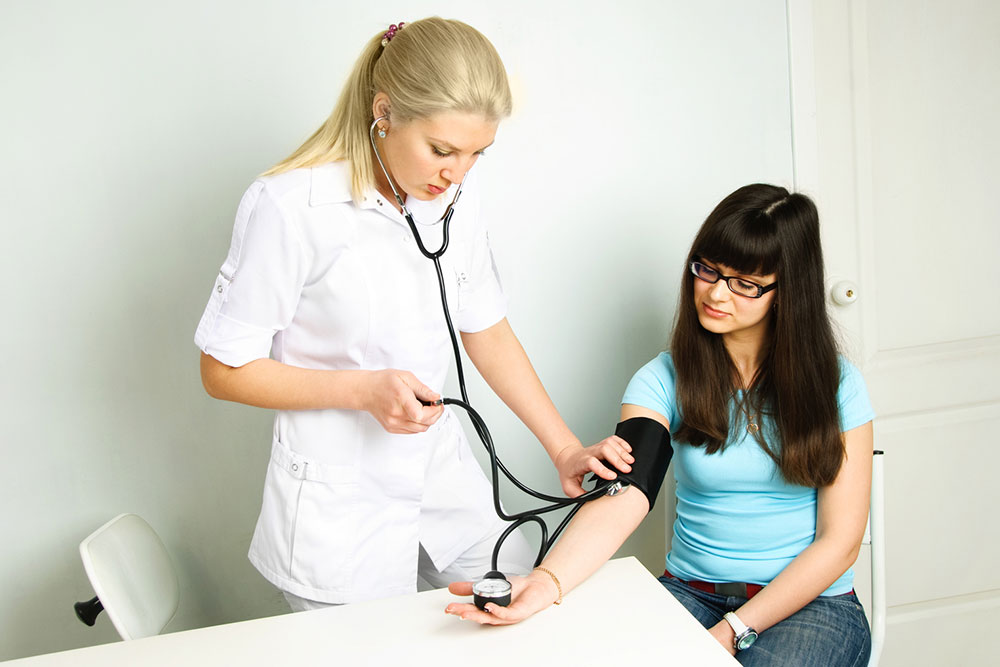Causes of High Blood Pressure and Tips to Reduce it
Blood pressure is the force exerted by the blood flowing in the blood vessels. Blood vessels carry blood pumped by the heart to all parts of the body. Proper supply of blood requires an optimum level of blood pressure and anything above or below this level is a cause of concern. Normal blood pressure is 120/80 mmHg, where 120 is systolic pressure and 80 is diastolic. Blood pressure measuring 130-139/80-89 mmHg is considered as the first stage of hypertension, and pressures above 140/90 mmHg are considered as the second stage of hypertension. Pressure above 180/120 warrants immediate medical treatment.
Prolonged hypertension results in thickening of the blood vessel walls (atherosclerosis).

Causes of High Blood Pressure
Hypertension is classified as primary and secondary hypertension. Primary or essential hypertension develops over time with no particular cause, whereas secondary hypertension occurs rapidly and becomes more severe than primary hypertension.
Although the exact pressure cause of high blood pressure is not known, several risk factors are attributed to hypertension.
- Being Overweight
Being overweight is a predisposition to developing high blood pressure. Excess body fat overloads the heart, which results in increased blood pressure. - Smoking
High blood pressure is among other health disorders caused by smoking. - Lethargic Lifestyle
Those leading a lethargic lifestyle without any physical workout are at a higher risk of developing high blood pressure. Unhealthy eating habits combined with a lethargic lifestyle result in fat deposits in blood vessels, which in turn narrow blood vessels. Constricted blood vessels cause hypertension. - Excessive Salt Intake
Consuming excessive salt causes a myriad of health disorders; high blood pressure is one of them. - Alcoholism
Alcoholism is also a risk factor for high blood pressure. - Genetic Predisposition
Some people are genetically disposed to high blood pressure. Abnormal gene mutations or genetic abnormalities inherited from either parent cause high blood pressure. - Stress
Stress at work or home affects the functioning of the heart, which in turn causes high blood pressure. - Family History
People with a family history of blood pressure are more likely to develop hypertension
Other factors include
- sleep apnea
- adrenal and thyroid disorders, and
- chronic kidney disease.
Ways to control high blood pressure
Prolonged hypertension paves way for life-threatening health conditions. When considering how to lower your blood pressure, the underlying cause of high blood pressure should also be kept in mind. Although medication is available for lowering blood pressure, a combination of medication, lifestyle and dietary changes is more effective in reducing and maintaining blood pressure.
Here are a few tips on how to lower your blood pressure:
- Shedding the Extra Pounds
People who are overweight are at a higher risk of developing high blood pressure. Weight loss and control is the most effective way of reducing and controlling blood pressure. Fat build-up around the waistline is a risk of cardiovascular problems. Maintaining a healthy weight and a trim waistline goes a long way in controlling blood pressure. - Indulging in Regular Physical Workouts
Regular physical exercise at the gym or walking or yoga helps in maintaining healthy body weight and also maintaining blood pressure. The key is to maintain consistency of physical exercise for reduction of blood pressure. - Eating Healthy
A healthy and wholesome diet ensures proper function of all the organs. Fiber- and protein-rich diets help in maintaining cholesterol, which in turn keep blood pressure under control. Avoiding packaged foods and consuming fresh food defines a healthy diet. - Lowering Sodium Consumption
Sodium content in the body has a direct bearing on the blood pressure. Making smart food choices while shopping by avoiding foods that contain excessive salt helps in reducing sodium intake. Conscious effort to minimize salt content while cooking is a good way to maintain blood pressure. - Limiting Smoking and Alcohol
Abstaining from smoking and alcohol is a big step toward controlling blood pressure. - Cutting Down Caffeine Intake
Although the link between caffeine and blood pressure is not very clear, limiting caffeine intake has shown a reduction in blood pressure in certain case studies. - Manage Stress
Chronic stress is a major contributor to hypertension. Shifting the focus on stress management at work and home is the first step toward reducing hypertension.
Maintaining a healthy blood pressure is essential for the effective functioning of the heart and other organs. Keeping a watch on the various risk factors holds the key to how to lower your blood pressure. Avoiding the risk factors and consuming medication (if required) helps in lowering blood pressure and controlling it.

